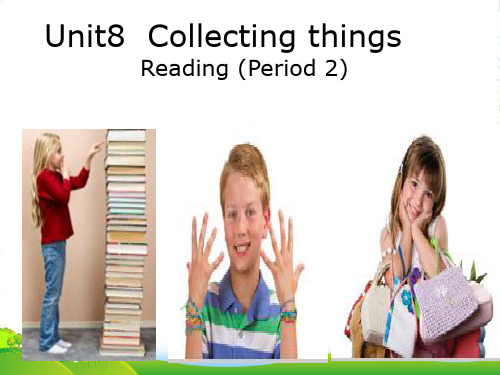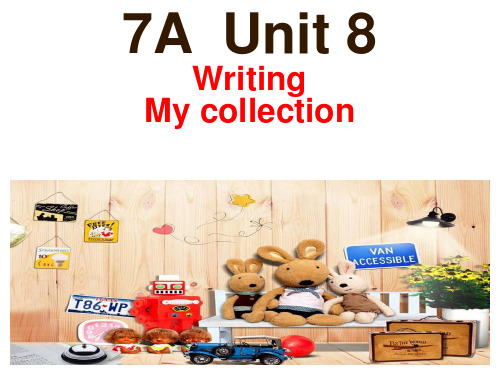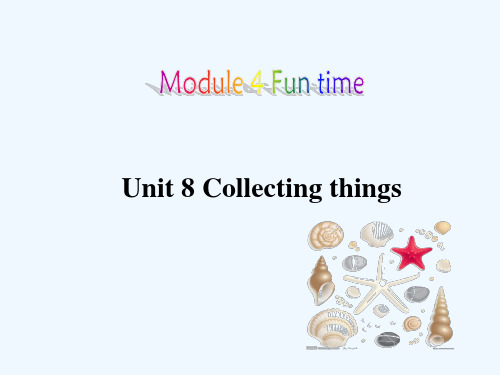中小学优质课件Collecting things课件.ppt
牛津深圳七年级英语上册《Unit 8 Collecting things》课件(共34张PPT)

6.Are Grandpa and Grandma free or busy?
They have a lot of free time.
√A. not busy B. large C. long
送分咯!!!
What Barbie says
Over 108 jobs: a doctor, a policewoman, an astronaut, a driver and so on.
Collecting Barbie Dolls
Boyfriend Height
Pets Jobs
Birthday
What
---What’s your dream? ---My dream is to …
(I hope/want to ….) ---Why? ---Because…
Name
---What’s your dream? ---My dream is to …
(I hope/want to ….) ---Why? ---Because…
What Barbie says
“I have a date tonight!" "I love being a fashion model!"
Collecting Barbie Dolls
Boyfriend
Pets
Height
Jobs
Birthday March9,
What
1959
Barbie says
6、 教育不在于使人知其所未知,而在于按其所未行而行。2021年11月2021/11/262021/11/262021/11/2611/26/2021 7、教育是一个逐步发现自己无知的过程。2021/11/262021/11/26November 26, 2021 8、is a admirable thing, but it is well to remember from time to time that nothing worth knowing can be taught.教育 是令人羡慕的东西,但是要不时地记住:凡是值得知道的,没有一个是能够教会的。2021/11/262021/11/262021/11/262021/Байду номын сангаас1/26
Unit 8 Collecting things Speaking公开课课件

year you
yellow young
A1
Listen carefully and circle the word you hear from each pair.
1. /nəu / /nau/ √ /haus/ √
4. /hə'ləu/ /'jeləu √ /
5. /wai/ √ /hai/
2. /gɔt/
3. /hɔ:s/
/gəut √ /
6. /hiə(r)/
/j√ iə(r)/
A2 Read these sentences. Pay attention to the letters in red. 1. A goat is going home by boat with Joe.
2. A brown cow is running around the
town now.
3. Young Yoyo plays with a yellow yo-yo.
4. Wendy walks to school when the
weather is warm.
You are going to interview three classmates about their collections. Follow the example. You: Hello, Harry. Do you collect anything? Harry: Yes, I collect postcards.
UK. It has a picture of Big Ben on it.
You:
I see. Thanks, Harry.
Harry: You are welcome.
Unit8 collecting things Writing部分课件

What about you? Please write back soon.
• What do you collect? • When did you start?
• How big is your collection? • How do you get them?
• What do you get from your collection?
It’s time to write an article.
Back
我喜欢集邮,因为它是很有教育意义的 (educational)。
I like collecting stamps because it is really / very educational.
Speak up
You: Hello, Harry. Do you collect anything? Harry: Yes, I collect postcards. You: That’s interesting . When did you start collecting them ? Harry: I started two years ago. You : Which is your favourite postcard? Harry: My favourite postcard is from the UK. It has a picture of Big Ben on it. You: I see. Thanks, Harry. Harry: You’re welcome.
Unit 8 Collecting things 课件 2-优质公开课-上教7上精品

5. They went inside and saw newspapers everywhere. inside在里面;往里面↔ 反义词:outside e.g.: Let's go inside. It was raining hard outside. newspaper n. 报纸;newspaper a. 可数名词,表示报纸的种类或作为看阅的报纸。 e.g.: a newspaper 一份报纸 He bought a newspaper. 他买了一份报纸。 (报纸是整份卖的) b. 不可数名词,表废弃的报纸或用来包裹物品用的报 纸。 e.g.: a piece of newspaper 一张报纸 He passed me a piece of newspaper. 他递给我一张报纸。
人称代词
人称 单数 复数
主格
第一人称 第二人称 第三人称 I you
宾格
me you
主格
we you they
宾格
us you them
he she it him her it
物主代词
类别 第一人称 形容词 性物主 代词 名词性 物主代 词 中文 my 单数 第二人称 your 第三人称 his her its 第一人称 our 复数 第二人称 your 第三人称 their
10. Collecting computer games is a waste of time. 收集电脑游戏是浪费时间。 a waste of…意为“浪费……” a waste of time 浪费时间,白费时间 e.g.: a waste of water浪费水 a waste of money浪费钱 a waste of space浪费空间 11. The games will take place in the playground. take place 发生;举行,举办。 一般指非偶然性事 件的发生,有事先的安排。 happen 发生,碰巧。 一般用于偶然或突发性事件。 happen to sb. 某人发生某事
Unit 8 Collecting things Period 1 Getting ready 课件

5
• 5.What is the happiest thing in your experience of collecting?
• 1.The most exciting moment was the time when I discovered what I had been dreaming of for a long time. • 2.Well,as I see,the happiest thing was to find a sincere friend who has the same interest with me • 3.Ok,I can tell you that the happiest thing is that I bought a thing at a really reasonable price.
4
• 4.Do other people understand your interest in collecting?
• 1.Well,most people understand me well and give me a lot of help. • 2.Yes,I think they can understand me well,for some of them have the same interest. • 3.Yes,even some of my friends don't collect,but we can talk about it.
Homework
想一想你的收集并介绍。
2
• 2.Why do you choose to collect these things?
• 1.I just like them.I think it is hard to collect someting for a clear purpose • 2.I choose to collect stamps because they are cultural things and they enrich my life. • 3.It is one of the ways to relax myself and I can make a lot of friends by collecting things
Unit 8 Collecting things

Unit 8 Collecting things词汇精讲1. collectcollect及物动词,意为“收集,搜集”。
例如:collect stamps 收集邮票 collect coins 收集硬币【拓展】collection名词,意为“收藏品、收集物”。
是动词collect 的名词形式,是由动词collect后缀-tion变化来的。
collector 名词,意为“收藏家”。
例如:These are my collections. 这些是我的收藏品。
My brother has a very good collection of stamps. 我的弟弟收集了许多邮票。
Mark is a famous stamp collector. Mark是一位著名的邮票收藏家。
2. unusualunusual 形容词,意为“与众不同的;不同寻常的”,反义词是usual。
例如:This is an unusual book. 这是一本不同寻常的书。
【拓展】un-是个前缀,意为“不”。
例如:happy“高兴的”— unhappy“不高兴的”;lucky“幸运的”— unlucky“不幸的”;important“重要的”— unimportant;“不重要的”;healthy“健康的”— unhealthy“不健康的”。
词汇精讲3. doorbelldoorbell名词,意为“门铃”,是个合成词,由“door+bell”构成,合成词是一种重要的构词法,对我们记忆单词很有帮助。
例如:blackboard 黑板 classroom 教室 newspaper 报纸classmate 同班同学 grandparent(s) (外)祖父母 everywhere 到处;各个地方4. in a short timein a short time意为“很短时间后”。
“in+一段时间”表示“多长时间以后”,常用于一般将来时,对“in+时间段”提问时用how soon。
Unit 8 Collecting things——物主代词 -优质公开课-上教7上精品

6. —Mike, is this _y_o_u_r_ picture?
—Yes, it is.
7. Mum, they are __m__y_ classmates, Rose and _h__e_r_brother David.
8.Jack, where are __y_o_u_r socks?
注意:形容词性物主代词和名词之间也还可以 添加其它形容词,对名词作进一步的修饰。例如:
This is his red pencil. 这是他的红铅笔。
注意事项:
1. 形容词性物主代词修饰名词时,不能和冠词 或指示代词一起使用。例如:
This is my pencil. 不能说成: This is my a pencil.
bike?
11.Ms Ding teaches ___u_s___(we) maths. 12.Bob loves __h_i_s___(he) mother very much.
13.Do they know __t_h_e_ir___ (they) new teacher? 14.__O__u_r___(we) new model plane can fly very
你妈妈在家吗? Is your mother at home?
名词性物主代词=形容词性物主代词+名词 为避免重复使用名词,有时可用“名词性物主代 词”来代替“形容词性物主代词+名词”的形式。 如:
My bag is yellow, hers is red . hers=her bag
1.我的名字
my name
2. 我的黑色的钢笔 my black pen
3.他的白色的夹克 his white jacket
英语七上Unit 8Collecting things Listening课件

3. To complete the table
Top tip
When you listen to people talking , you need to catch the important words and pay attention to the follows:
Before you listen, make sure you know the following words: sentence n.句子 magazine n. 杂志
something pron. 某事;某物 really adv. 确实,的确 a waste of time 浪费时间 (be) bad for 对……有害的 (be) interested in 对……感兴趣
☺ Write down the relevant (相关的) information quickly.
Listen to a TV report interviewing three people about student’s collections. Who says the sentences below? Put a tick (√) in the boxes.
push
soon
grandson
inside newspaper
follow
everywhere
hardly
granddaughter
space
free should
1. To understand an interview about students’ collections
2. To learn to catch the detailed
- 1、下载文档前请自行甄别文档内容的完整性,平台不提供额外的编辑、内容补充、找答案等附加服务。
- 2、"仅部分预览"的文档,不可在线预览部分如存在完整性等问题,可反馈申请退款(可完整预览的文档不适用该条件!)。
- 3、如文档侵犯您的权益,请联系客服反馈,我们会尽快为您处理(人工客服工作时间:9:00-18:30)。
一.人称代词
数
单数
复数
人称 格 主格 宾格 主格 宾格
第一人称 I me we us
第二人称 you you you you
he him 第三人称 she her they them
it it
பைடு நூலகம்
人称代词指代人或物,有主格和宾格之 分。 1. 主格在句中可充当主语。 She likes collecting newspapers. 她喜欢收集报纸。
Unit 8 Collecting things
Grammar
objectives
To learn how to use personal pronouns, possessive adjectives and possessive pronouns
1. She pushed it and soon Grandpa opened the door.
telephone number? — Me.
This is my phone card. It is mine. These are our toys. They are ours. Her book is blue. Yours is red. This is my chair. That is his. Our classroom is big. Theirs is small.
3. Joe’s cat is very cute. It has a black body and _it_s_(它的) paws (爪子) are white.
4. — Whose keys are these, _h_i_s (他的)or _h_e_r_s (她的)?
— I’m not sure. Maybe they are not _th_e_i_r_s (他们的).
We have a lot of free time. 我们有大量的空余时间。
I have many good friends. 我有很多好朋友。
2. 宾格在句子充当动词、介词的宾语。 Can you help me? 你能帮助我吗?
We are waiting for them. 我们正在等待他们。
_H_e_ (他) is a famous singer. Do _y_o_u_ (你) often play basketball after
school? _S_h_e_ (她) goes to school on foot with _m__e(我) every morning. Please pass _u_s__ (我们) the ball. _T__h_e_y_ (他们) are listening to the radio. Mr Green tell _y_o_u_ (你们) some stories.
ruler. c. Let’s clean their room first, and then
clean ours. d. Let’s clean their room first, and then
5. Our classroom is big. T_h__ei_r_s (他们 的) is small.
根据句意和汉语提示完成句子。
1. This is _m_y_ (我的) jacket, but these shoes are not _m__in_e_(我的).
2. That’s not _h_i_s(他的) ball. It’s _o_u_r_s (我们 的).
My parent are both doctors. 我的父母都是医生。
Their books are new. 他们的书是新的。
Her mother is our English teacher. 她的妈妈是我们的英语老师。
2. 名词性物主代词应单独使用,后面不跟名 词。
a. May I use your ruler? I have lost mine. b. May I use your ruler? I have lost my
2. She loves doorbells.
3. They went inside and saw newspapers everywhere.
4. The children followed her into the living room.
1. _S_h_e_ pushed _it_ and soon Grandpa opened the door.
二.物主代词
人 第一人称 第二人称
称 分
单数
复数 单数
复数
类
第三人称
单数
复数
形
容 词
my
our your your his her its their
性
名 词
mine ours yours yours his
hers its theirs
性
物主代词表示所属关系,有名词性和形 容词性物主代词之分。 1. 形容词性物主代词修饰名字,作定语, 不可独立使用。
Our teacher will have supper with us. 我们的老师和我们一起吃晚餐。
注意: 1. 作主语补语时习惯用宾格: — Is it the milkman at the door? — Yes, that’s him. 2. 在省略谓语的句子中的主语习惯用
宾格: — Does any of you know Peter’s
2. _S_h_e loves doorbells.
3.T__h_e_y went inside and saw
Reagody? newspapers everywhere.
4. The children followed h__er_ into the living room.
完成下面有关人称代词的填空练习。
1. This is my phone card. It is _m__in_e_.
2. These are our toys. They are _o_u_r_s .
go 3. Her book is blue.Y_o_u_r_s_ (你的) is red.
Ready? 4. This is my chair. That is _h_is_(他的).
